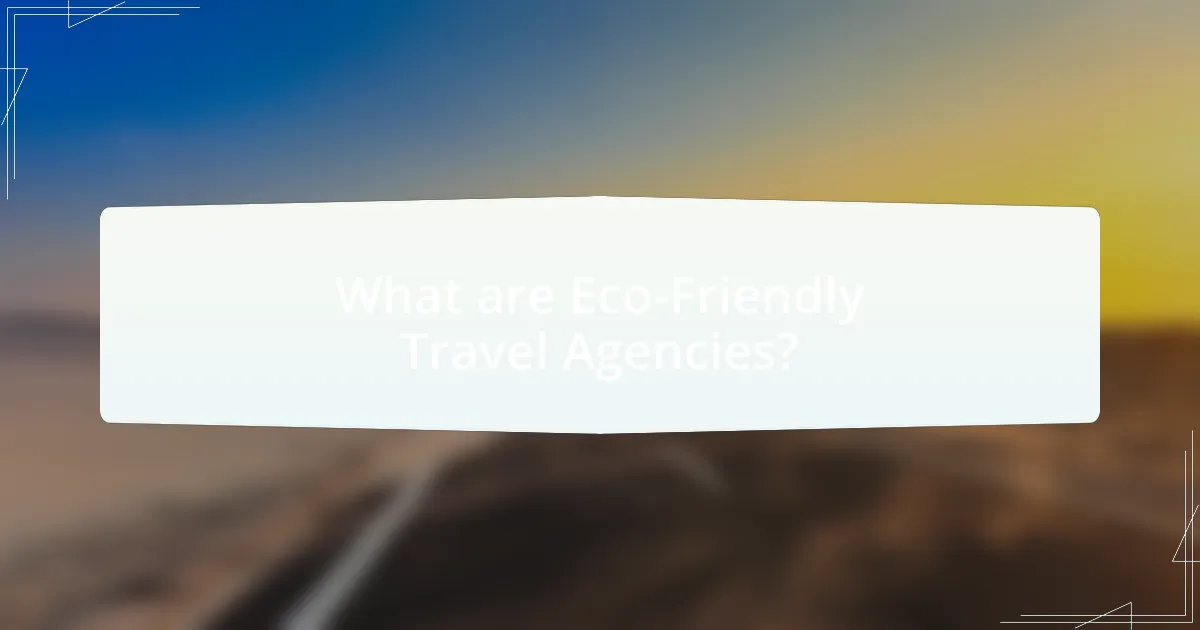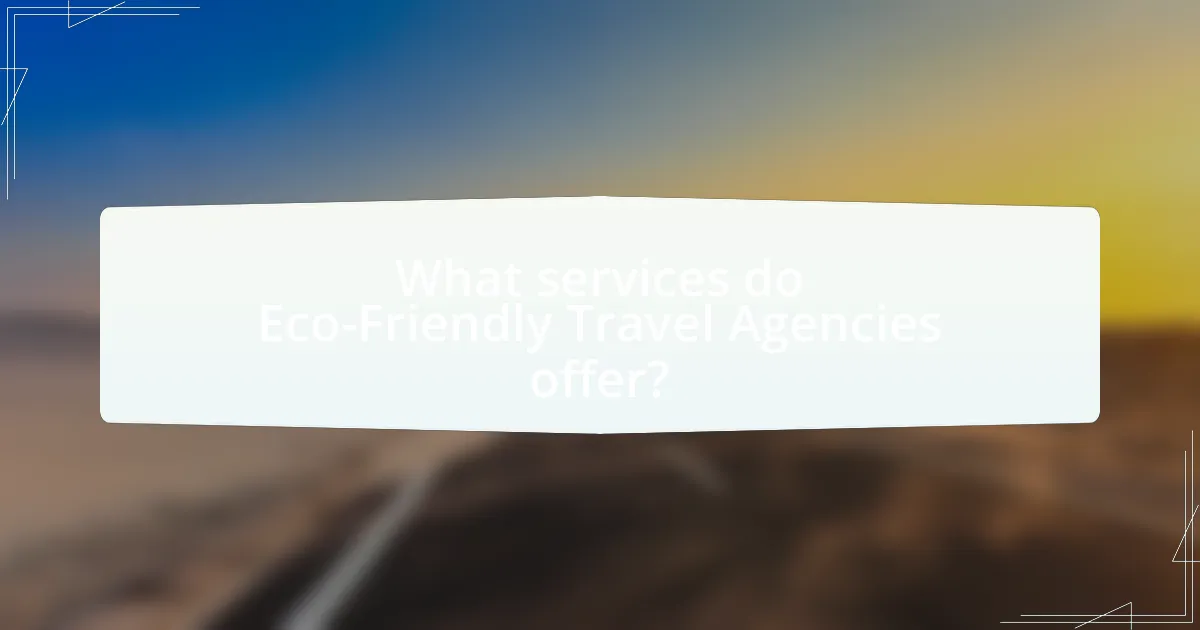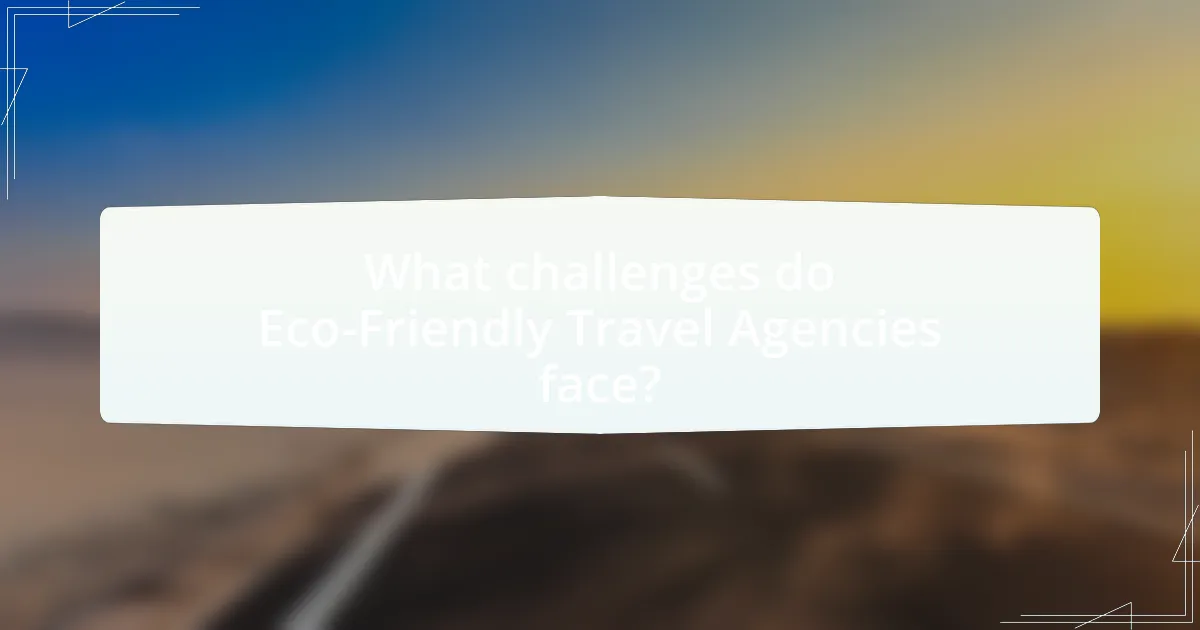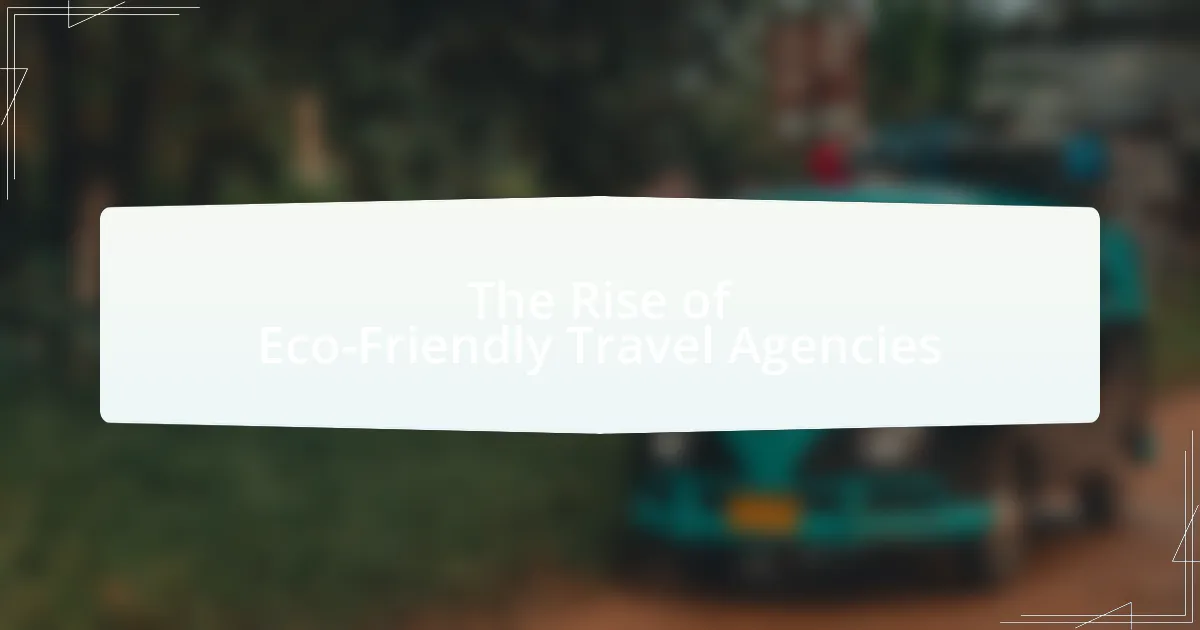Eco-friendly travel agencies are organizations that emphasize sustainable tourism practices to reduce environmental impact and support local communities. This article explores the differences between eco-friendly and traditional travel agencies, highlighting the principles that guide their operations, the services they offer, and the growing consumer demand for sustainable travel options. It also addresses the challenges faced by eco-friendly agencies, the role of technology in promoting sustainable practices, and best practices for selecting an eco-friendly travel agency. The discussion underscores the importance of responsible tourism in fostering environmental conservation and community engagement.

What are Eco-Friendly Travel Agencies?
Eco-friendly travel agencies are companies that prioritize sustainable tourism practices to minimize environmental impact. These agencies often promote eco-friendly accommodations, responsible wildlife tourism, and carbon offset programs, ensuring that travel experiences contribute positively to local communities and ecosystems. For instance, according to a report by the Global Sustainable Tourism Council, sustainable tourism can reduce carbon emissions by up to 30% when managed effectively.
How do Eco-Friendly Travel Agencies differ from traditional travel agencies?
Eco-friendly travel agencies prioritize sustainable practices, while traditional travel agencies typically focus on maximizing profit without a specific emphasis on environmental impact. Eco-friendly agencies often promote eco-conscious accommodations, carbon offset programs, and responsible tourism activities that minimize ecological footprints. In contrast, traditional agencies may not consider the environmental implications of their travel packages, often opting for more conventional options that may not prioritize sustainability. This distinction is evident in the growing consumer demand for sustainable travel options, with a 2021 survey indicating that 87% of travelers are interested in sustainable travel practices, highlighting the shift towards eco-friendly travel solutions.
What principles guide the operations of Eco-Friendly Travel Agencies?
Eco-Friendly Travel Agencies operate under principles that prioritize sustainability, conservation, and community engagement. These agencies focus on minimizing environmental impact by promoting eco-friendly transportation options, supporting local economies, and encouraging responsible tourism practices. For instance, they often partner with local businesses to provide authentic experiences while ensuring that tourism benefits the host communities economically. Additionally, they implement practices such as reducing waste, conserving resources, and educating travelers about environmental issues, which aligns with the global movement towards sustainable travel.
How do Eco-Friendly Travel Agencies promote sustainable tourism?
Eco-Friendly Travel Agencies promote sustainable tourism by offering travel options that minimize environmental impact and support local communities. These agencies often prioritize eco-friendly accommodations, such as hotels that utilize renewable energy and sustainable practices, thereby reducing carbon footprints. They also encourage travelers to engage in activities that respect local ecosystems, such as wildlife conservation tours and cultural experiences that benefit indigenous populations. According to a report by the Global Sustainable Tourism Council, sustainable tourism practices can lead to a 30% reduction in greenhouse gas emissions compared to traditional tourism methods. By educating travelers on responsible practices and providing sustainable choices, Eco-Friendly Travel Agencies play a crucial role in fostering a more environmentally conscious travel industry.
Why is there a growing demand for Eco-Friendly Travel Agencies?
There is a growing demand for Eco-Friendly Travel Agencies due to increasing consumer awareness of environmental issues and a desire for sustainable travel options. As climate change and environmental degradation become more pressing concerns, travelers are seeking ways to minimize their carbon footprint and support eco-conscious practices. According to a 2021 report by Booking.com, 81% of global travelers feel that sustainable travel is important, and 70% are more likely to book with a travel provider that demonstrates sustainable practices. This shift in consumer preferences is driving the growth of eco-friendly travel agencies that prioritize responsible tourism and environmental stewardship.
What factors contribute to the rise in eco-conscious travel?
The rise in eco-conscious travel is primarily driven by increasing awareness of environmental issues among consumers. This awareness has led travelers to seek sustainable options that minimize their ecological footprint. According to a 2021 report by Booking.com, 81% of global travelers expressed a desire to travel sustainably, highlighting a significant shift in consumer preferences. Additionally, the impact of climate change and the desire to preserve natural resources have prompted travelers to prioritize eco-friendly accommodations and activities. The growth of social media has also played a role, as influencers and platforms promote sustainable travel practices, further encouraging eco-conscious choices among travelers.
How do consumer preferences influence the growth of Eco-Friendly Travel Agencies?
Consumer preferences significantly influence the growth of eco-friendly travel agencies by driving demand for sustainable travel options. As more travelers prioritize environmental responsibility, eco-friendly travel agencies experience increased patronage, leading to their expansion. A 2021 survey by Booking.com revealed that 81% of global travelers felt strongly that companies should help reduce their carbon footprint, indicating a clear consumer shift towards sustainability. This growing preference compels travel agencies to adopt eco-friendly practices, such as carbon offsetting and promoting local experiences, further enhancing their appeal and market share.

What services do Eco-Friendly Travel Agencies offer?
Eco-Friendly Travel Agencies offer services that prioritize sustainable travel options, including eco-friendly accommodations, carbon offset programs, and responsible tour packages. These agencies often collaborate with local communities to promote cultural preservation and environmental conservation. For instance, they may provide options for eco-lodges that utilize renewable energy sources and support local economies, thereby reducing the carbon footprint associated with travel. Additionally, they may offer educational resources on sustainable practices and promote activities that have minimal environmental impact, such as hiking or wildlife conservation tours.
How do Eco-Friendly Travel Agencies curate their travel packages?
Eco-Friendly Travel Agencies curate their travel packages by prioritizing sustainable practices and local experiences. They assess destinations based on environmental impact, selecting accommodations that implement green initiatives, such as energy efficiency and waste reduction. Additionally, these agencies often collaborate with local businesses to promote community engagement and support the local economy. Research indicates that 70% of travelers prefer eco-friendly options, highlighting the demand for sustainable travel solutions. By focusing on these criteria, eco-friendly agencies ensure that their packages align with the values of environmentally conscious travelers.
What types of accommodations do Eco-Friendly Travel Agencies recommend?
Eco-Friendly Travel Agencies recommend accommodations such as eco-lodges, sustainable hotels, and glamping sites. These types of accommodations prioritize environmental sustainability by utilizing renewable energy sources, implementing water conservation practices, and sourcing local materials. For instance, eco-lodges often feature designs that blend with nature and minimize ecological impact, while sustainable hotels may have certifications like LEED (Leadership in Energy and Environmental Design) to validate their green practices. Glamping sites provide a unique experience by combining luxury with nature, often using tents or yurts that have minimal environmental footprints.
How do Eco-Friendly Travel Agencies incorporate local experiences into their offerings?
Eco-Friendly Travel Agencies incorporate local experiences into their offerings by partnering with local communities to provide authentic cultural interactions and sustainable tourism practices. These agencies often design itineraries that include local guides, workshops, and experiences that highlight regional traditions, cuisine, and crafts, ensuring that travelers engage meaningfully with the destination. For instance, a study by the Global Sustainable Tourism Council indicates that such practices not only enhance the travel experience but also contribute to the local economy, as a significant portion of the revenue generated stays within the community.
What role do Eco-Friendly Travel Agencies play in environmental conservation?
Eco-Friendly Travel Agencies play a crucial role in environmental conservation by promoting sustainable tourism practices that minimize ecological impact. These agencies prioritize eco-friendly accommodations, transportation, and activities, which help reduce carbon footprints and preserve natural resources. For instance, a study by the Global Sustainable Tourism Council found that sustainable tourism can reduce greenhouse gas emissions by up to 30% compared to conventional tourism. By educating travelers about responsible practices and supporting local communities, Eco-Friendly Travel Agencies contribute to the protection of biodiversity and the conservation of cultural heritage.
How do these agencies support local communities and economies?
Eco-friendly travel agencies support local communities and economies by promoting sustainable tourism practices that prioritize local culture and resources. These agencies often collaborate with local businesses, ensuring that a significant portion of the travel budget is spent within the community, which helps stimulate local economies. For example, they may partner with local guides, artisans, and restaurants, thereby creating jobs and preserving cultural heritage. Additionally, eco-friendly travel agencies frequently invest in community projects, such as environmental conservation initiatives or infrastructure improvements, which further enhance the quality of life for residents. According to a study by the World Travel & Tourism Council, sustainable tourism can generate up to 10% of global GDP, highlighting the economic impact of these agencies on local communities.
What initiatives do Eco-Friendly Travel Agencies undertake to reduce carbon footprints?
Eco-friendly travel agencies implement various initiatives to reduce carbon footprints, including promoting sustainable transportation options, such as electric vehicles and public transit. These agencies often partner with eco-conscious accommodations that utilize renewable energy sources and practice waste reduction. Additionally, they encourage travelers to engage in carbon offset programs, which fund projects aimed at reducing greenhouse gas emissions, such as reforestation and renewable energy initiatives. According to a 2021 report by the Global Sustainable Tourism Council, sustainable travel practices can reduce carbon emissions by up to 30% when effectively integrated into travel planning.

What challenges do Eco-Friendly Travel Agencies face?
Eco-friendly travel agencies face several significant challenges, including higher operational costs, limited consumer awareness, and competition from traditional travel agencies. Higher operational costs arise from sourcing sustainable products and services, which can be more expensive than conventional options. Limited consumer awareness affects demand, as many travelers may not prioritize eco-friendly options or may lack knowledge about the benefits of sustainable travel. Additionally, competition from traditional travel agencies, which often offer lower prices and more established marketing strategies, makes it difficult for eco-friendly agencies to attract customers. These challenges hinder the growth and sustainability of eco-friendly travel agencies in a market that is still adapting to environmental concerns.
How do Eco-Friendly Travel Agencies address misconceptions about eco-tourism?
Eco-Friendly Travel Agencies address misconceptions about eco-tourism by providing accurate information and promoting sustainable practices. These agencies often clarify that eco-tourism is not merely about visiting natural areas but involves responsible travel that conserves the environment and improves the well-being of local communities. They educate travelers on the importance of minimizing their carbon footprint, supporting local economies, and respecting cultural heritage. For instance, a study by the International Ecotourism Society indicates that eco-tourism can lead to significant conservation efforts and community development when done correctly. By offering transparent communication and educational resources, these agencies effectively dispel myths and foster a deeper understanding of eco-tourism’s benefits.
What barriers exist for travelers seeking eco-friendly options?
Travelers seeking eco-friendly options face several barriers, including higher costs, limited availability, and lack of awareness. Higher costs often deter travelers, as eco-friendly accommodations and transportation can be more expensive than conventional options. Limited availability of eco-friendly services in certain destinations restricts choices for travelers. Additionally, a lack of awareness about eco-friendly options and their benefits can prevent travelers from making informed decisions. According to a 2021 survey by Booking.com, 61% of travelers expressed a desire to travel sustainably, yet only 39% felt they had access to eco-friendly options, highlighting the gap between interest and availability.
How do Eco-Friendly Travel Agencies compete with traditional travel agencies?
Eco-friendly travel agencies compete with traditional travel agencies by offering sustainable travel options that appeal to environmentally conscious consumers. These agencies prioritize eco-friendly practices such as carbon offsetting, promoting local cultures, and supporting conservation efforts, which resonate with a growing demographic that values sustainability. According to a 2021 report by Booking.com, 81% of travelers expressed a desire to stay in eco-friendly accommodations, highlighting the demand for responsible travel choices. This shift in consumer preferences allows eco-friendly agencies to differentiate themselves by aligning their services with the values of their target market, thereby gaining a competitive edge over traditional agencies that may not prioritize sustainability.
What future trends can we expect in the eco-friendly travel industry?
The eco-friendly travel industry is expected to see a significant rise in sustainable practices, including increased use of renewable energy sources and carbon offset programs. As travelers become more environmentally conscious, eco-friendly accommodations and transportation options will likely expand, with a projected 70% of travelers prioritizing sustainability in their choices by 2025, according to a study by Booking.com. Additionally, technology will play a crucial role, with advancements in eco-tourism apps and platforms that promote responsible travel behaviors and local experiences.
How might technology influence the growth of Eco-Friendly Travel Agencies?
Technology significantly influences the growth of eco-friendly travel agencies by enhancing operational efficiency and improving customer engagement. Digital platforms enable these agencies to streamline booking processes, manage resources effectively, and reduce their carbon footprint through optimized travel itineraries. For instance, the use of artificial intelligence can help in predicting travel trends and personalizing customer experiences, which increases customer satisfaction and loyalty. Additionally, advancements in mobile technology allow travelers to access eco-friendly options easily, promoting sustainable choices. According to a report by the Global Sustainable Tourism Council, 70% of travelers are more likely to choose eco-friendly options when they are readily available online, demonstrating that technology not only facilitates access but also drives consumer behavior towards sustainability.
What emerging markets are likely to adopt eco-friendly travel practices?
Emerging markets such as India, Brazil, and Southeast Asian countries are likely to adopt eco-friendly travel practices. These regions are experiencing rapid urbanization and tourism growth, prompting a shift towards sustainable practices to mitigate environmental impacts. For instance, India has seen a rise in eco-tourism initiatives, with the government promoting sustainable travel through policies and incentives. Brazil’s diverse ecosystems and commitment to conservation are driving eco-friendly tourism, particularly in the Amazon region. Additionally, countries like Thailand and Vietnam are increasingly focusing on sustainable tourism to attract environmentally conscious travelers, supported by initiatives from local governments and NGOs.
What are some best practices for choosing an Eco-Friendly Travel Agency?
To choose an eco-friendly travel agency, prioritize agencies that demonstrate a commitment to sustainable practices, such as carbon offsetting, supporting local communities, and minimizing environmental impact. Look for certifications from recognized organizations like the Global Sustainable Tourism Council, which verifies that the agency adheres to established sustainability standards. Additionally, evaluate the agency’s transparency regarding their environmental policies and practices, as well as their partnerships with local conservation efforts. Research customer reviews and testimonials to assess the agency’s reputation for responsible tourism. These practices ensure that the agency aligns with eco-friendly values and contributes positively to the environment and local cultures.

Leave a Reply